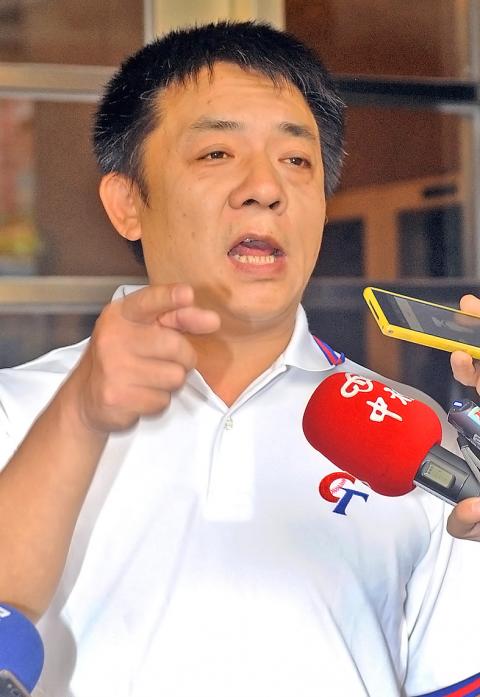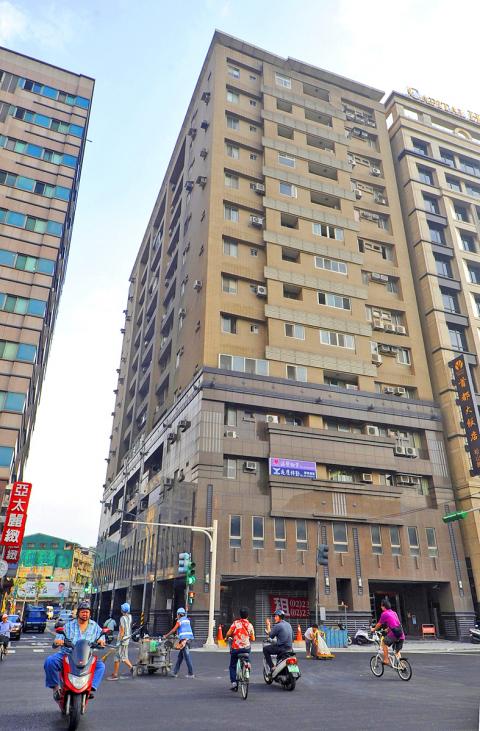The Supreme Court yesterday ordered a construction firm responsible for a building in Taipei that collapsed during the Sept. 21, 1999, earthquake to pay a total of NT$330 million (US$10.8 million) in damages to the building’s 170 residents, bringing a 15-year battle over compensation to a close.
The magnitude 7.3 earthquake caused 2,456 deaths nationwide, including 87 people in Taipei’s Tunghsing Building (東星大樓), which was at the corner of Bade Road and Hulin Street.
One hundred and seventy of the building’s residents filed a NT$2.8 billion civil lawsuit against its architect, Chang Tsung-hsin (張宗炘), now deceased; Hung Gu Construction (鴻固營造); Hsieh Lung-sheng (謝隆盛), the now-deceased former manager of original contractor Hung Cheng Construction (宏程建設), and the inheritor of his estate, Hsieh Wu Hsueh-hui (謝吳雪蕙); Hung Kuo Construction (宏國建設); and state-run First Bank.

Photo: Liao Chen-huei, Taipei Times
However, the claimants are unlikely to receive any payment, as the individual defendants are either deceased or out of the country, while the companies named in the case have cleared their assets, the lawyer for the plaintiffs said.
The collegiate bench said that based on reports by the Taiwan Professional Civil Engineers Association and the Executive Yuan’s Public Construction Commission, the building’s design was flawed, with the builders underestimating the weight per floor and the building’s total weight by 18 percent.
The horizontal force estimated in the event of seismic activity had been scaled down due to the miscalculations, so the number of reinforced concrete beams used per level was insufficient, the collegiate bench ruling report said.

Photo: Liao Chen-huei, Taipei Times
The stress levels of the concrete beams were insufficient and the length of the stirrup hooks securing the steel-reinforced bars were substandard, the report read, adding that the connecting joints had not been reinforced with stirrup hooks or the reinforced areas were not secured tightly, causing the entire building to slowly collapse.
Cheng Wen-lung (鄭文龍), a lawyer who has represented the residents since 2003, yesterday said that the ruling was “merely a formality,” as the companies or individuals charged with paying compensation were either dead, had left the country or cleared their assets.
Cheng said his clients would not receive any money aside from a national compensation of NT$120 million that the residents had settled out of court with the Taipei City Government in 2007.
Although the collegiate bench concurred with previous rulings that Chang, Hsieh and construction overseer Hsu Mao-hsiung (徐茂雄) should pay damages, Chang and Hsieh are dead, leaving Hsieh Wu and Hsu to shoulder the payment.
The court upheld the ruling that Hung Gu Construction president Tu Ming-fu (杜明福) and board members Lin Hsieh Han-chien (林謝罕見) and Lin Hung-ming (林鴻明) need not pay damages, as they were not part of the construction team.
It also exonerated First Bank from any responsibility, saying that the repairs the bank was conducting at the time did not the affect the building’s structural integrity.
Tu reportedly left the country in 2012.
Hsu was sentenced to 18 months in prison for professional negligence.
Additional reporting by CNA

A Ministry of Foreign Affairs official yesterday said that a delegation that visited China for an APEC meeting did not receive any kind of treatment that downgraded Taiwan’s sovereignty. Department of International Organizations Director-General Jonathan Sun (孫儉元) said that he and a group of ministry officials visited Shenzhen, China, to attend the APEC Informal Senior Officials’ Meeting last month. The trip went “smoothly and safely” for all Taiwanese delegates, as the Chinese side arranged the trip in accordance with long-standing practices, Sun said at the ministry’s weekly briefing. The Taiwanese group did not encounter any political suppression, he said. Sun made the remarks when

The Taiwanese passport ranked 33rd in a global listing of passports by convenience this month, rising three places from last month’s ranking, but matching its position in January last year. The Henley Passport Index, an international ranking of passports by the number of designations its holder can travel to without a visa, showed that the Taiwan passport enables holders to travel to 139 countries and territories without a visa. Singapore’s passport was ranked the most powerful with visa-free access to 192 destinations out of 227, according to the index published on Tuesday by UK-based migration investment consultancy firm Henley and Partners. Japan’s and

BROAD AGREEMENT: The two are nearing a trade deal to reduce Taiwan’s tariff to 15% and a commitment for TSMC to build five more fabs, a ‘New York Times’ report said Taiwan and the US have reached a broad consensus on a trade deal, the Executive Yuan’s Office of Trade Negotiations said yesterday, after a report said that Washington is set to reduce Taiwan’s tariff rate to 15 percent. The New York Times on Monday reported that the two nations are nearing a trade deal to reduce Taiwan’s tariff rate to 15 percent and commit Taiwan Semiconductor Manufacturing Co (TSMC, 台積電) to building at least five more facilities in the US. “The agreement, which has been under negotiation for months, is being legally scrubbed and could be announced this month,” the paper said,

Japan and the Philippines yesterday signed a defense pact that would allow the tax-free provision of ammunition, fuel, food and other necessities when their forces stage joint training to boost deterrence against China’s growing aggression in the region and to bolster their preparation for natural disasters. Japan has faced increasing political, trade and security tensions with China, which was angered by Japanese Prime Minister Sanae Takaichi’s remark that a Chinese attack on Taiwan would be a survival-threatening situation for Japan, triggering a military response. Japan and the Philippines have also had separate territorial conflicts with Beijing in the East and South China